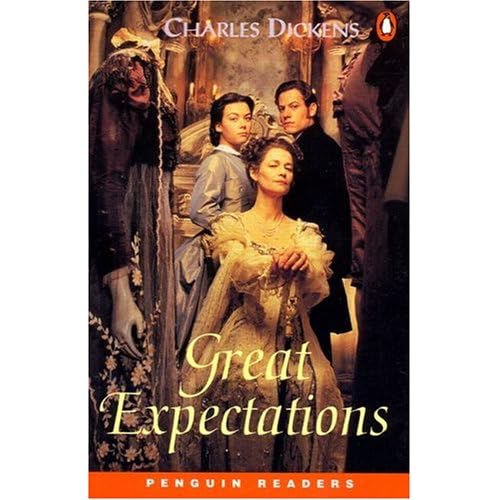
--The blurb--
"Great Expectations opens unforgettably in a twilit and overgrown churchyard on the eerie Kent marshes. There the orphan Pip is disturbed to meet an escaped convict, Magwitch, but gives him food, in an encounter that is to haunt both their lives. How Pip receives riches from a mysterious benefactor, snobbishly abandons his friends for London society and 'great expectations', and grows through misfortune and suffering to maturity is the theme of one of Dicken's best-loved novels. In Great Expectations Dickens blends gripping drama with penetrating satire to give a compelling story rich in comedy and pathos: he has also created two of his finest, most haunting characters in Pip and Miss Havisham."
blurb from www.amazon.co.uk
--The review--
As someone who studied English at university, I should have arguably read this before now. However, my first acquaintance with Dickens in Bleak House (which was part of my studies) was perhaps not the best start: it is long and intimidating, although there is a good story underneath, and so plucking up the inclination to go near another Dickens creation took some time. Reading Dickens can still be, I've found, like wading through treacle: it isn't concise and would probably be sent back by a modern-day editor with lots of red pen on it. However, occasionally through the treacle Dickens manages to cut like a knife with well-chosen words, a breathtaking passage of description, or with a touch of sardonic wit, so the prose is perhaps worth savouring for these hidden gems alone, although it can be hard work.
Dickens' mastery of imagery is as clear here as in his other works, and he illuminates a variety of different settings wonderfully, from the slush of central London to the misty marshes. Equally, the characters were easy to visualise, and the unusual ones, such as Miss Havisham, are what make the book what it is. However, I found it difficult to empathise with any of the characters, or form any real connection with or feeling for them (even along negative lines), which is rarely a good sign. My motivation to continue reading was more out of the effort already expended rather than out of any genuine desire to discover the characters' fates. Perhaps more crucially, unlike other Dickens novels such as Bleak House or A Christmas Carol, where the story makes it worth wading through the prose's treacle, the storyline of Great Expectations seemed to me to be implausible in an otherwise plausible context, and too much effort was made to link the story to the title, to the point of seeming unnatural.
Unusually, I found the contextual information provided with my edition of the novel to be most illuminating: reading the alternative ending proved fascinating, for instance. It is also worth bearing in mind that Dickens wrote originally in serials for newspaper audiences, so the style required for this purpose may not carry over so well to a full-length novel, in much the same way as Jeremy Clarkson's columns are funny in the Times every Sunday, but more wearying when they appear as aggregated collections in his books. In this format, then, the story would perhaps be more enjoyable, although the plot is complicated in places, particularly concerning the connections between some of the characters, so a serialised format may make these more difficult to follow, rather than less.
Dickens' mastery of description only compounded my disappointment with Great Expectations: it almost seemed a shame to only enjoy it for this, without any enthusiasm for the plot or its characters. While enjoyability is subjective, I would perhaps steer interested readers in the direction of Oliver Twist, for example, for a more vibrant cast of characters and overall more satisfying read.





No comments:
Post a Comment